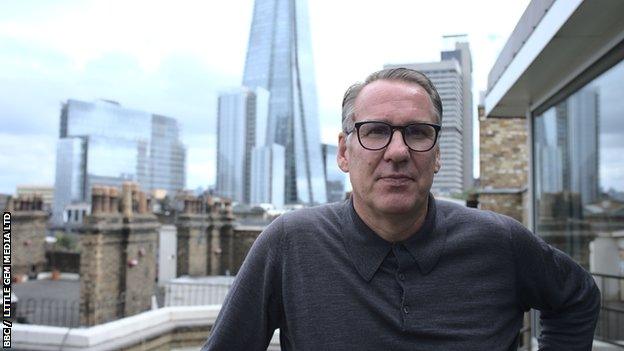Paul Merson: Former players in gambling ads 'sicken me'
- Published

Merson played for Arsenal, Middlesbrough and Aston Villa in his career
Former England and Arsenal footballer Paul Merson says it "sickens" him when he sees former players and managers in gambling adverts.
Merson is campaigning for betting laws to be changed as part of an upcoming government review.
Last year he made a BBC documentary about his gambling addiction and the industry, saying adverts are a "major trigger".
"I see people in adverts and they are rich," Merson said.
The 53-year-old Merson, who had a 21-year league career, added: "I could understand it if they were a League One or League Two player and had not earned much from the game, but the people doing the adverts are multi-millionaires.
"Do they need the money? Do you need that extra £50,000? It sickens me.
"If they knew a family member who was addicted, I don't think they would do it. They don't really understand the addiction and the compulsion and what it does to lives.
"Then you have podcasts sponsored by betting companies. Do you need to make that buck as well? It does my head in."
Betting advertising in football is one of the issues being debated as part of the 2005 Gambling Act review which is set to be announced in the coming weeks.
Campaigners want a ban on football shirt sponsorships, adverts around the pitch and in club marketing.
Merson says he cannot watch adverts on TV during football matches and walks out of the room to avoid being triggered, but has struggled when adverts appear on radio stations and during breaks for comedy programmes.
Speaking at a Gambling Reform Rally he added clubs are "lazy" when they say they cannot find alternative sponsors and could go out of business.
"Most companies would want to be in the Premier League," said Merson. "Why not offer your players less wages?"
English Football League chairman Rick Parry says a ban on gambling sponsorship could cause some of its 72 clubs "to go under" and would cost the EFL £40m a year in lost revenue.
Following his documentary, where the two-time First Division title winner explained his losses and how he had been addicted for his whole adult life, Merson expected to be contacted by clubs in order to offer younger players education.
But he said he had little response.
Merson told BBC Sport: "When I did my documentary, I thought I'd be inundated with clubs ringing up asking me to talk to the youngsters, but I don't think clubs see gambling as a problem. If it was drinking or drugs they'd be all over it like a rash."
Asked if young players could be offered more education, he added: "One hundred percent.
"It doesn't matter how much you earn, it'll soon go. You can't drink 30 grand a week, but you can gamble it in a week. Gambling is a hidden problem and it's hard.
"That's why so many people commit suicide because it's always too late. When I was drinking it was visible, but this is an invisible problem so I was surprised [no clubs contacted me]."
Asked about the response to his documentary from his peers, Merson added: "Nothing.
"There is still a stigma about gambling. Everybody in their head is like 'just have a bit of willpower'.
"The compulsion can be overwhelming. Many people don't have a choice and don't know they are problem gamblers. Advertising is a major trigger."
A spokesperson for the Betting and Gaming Council, added: "During the pandemic, the regulated betting and gaming industry provided some of the country's most popular sport with vital funding through sponsorship. Horse racing received £350m, the English Football League received £40m, and snooker, darts and rugby league received more than £12.5m.
"Betting advertising and sponsorship must comply with strict guidelines and safer gambling messaging is regularly and prominently displayed. Operators' logos cannot be used on children's clothing - including replica football kits - while the whistle to whistle ban has reduced the number of TV betting commercials viewed by children during live sports before the watershed by 97 per cent.
"According to the Gambling Commission, the rate of problem gambling has fallen to 0.3 per cent [in the year to September 2021], down from 0.6 per cent 18 months ago."

Covid pseudoscience? Delve into the conspiracy that gripped a picturesque British town
International Women's Day: Four strikes that made history
